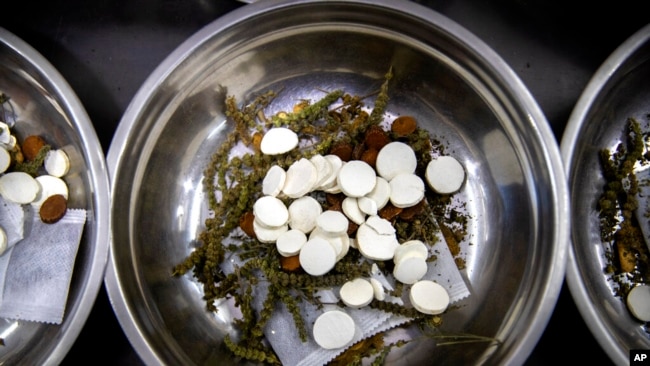薬草のみならず、サイヤ蛇など動物由来の材料が含まれます。
乾燥物ですが野生動物売買の市場がある中国、中身はどうなんでしょうか。
入手経路が不安です。
科学的根拠を否定すれば、なんでも薬となるでしょう。
VOAで英語を学び、世界の今を見つめましょう!!
中国、アフリカに伝統医学を輸出(和訳)
China Exports Its Traditional Medicine to Africa
Jan.26,2022
ケニアの首都ナイロビ、ヒン・パル・シンさんはOriental Chinese Herbal Clinic東洋漢方クリニックを訪れる患者の一人です。
シンさんは85歳。彼は5年前から背中に問題を抱えています。シンさんは今、漢方治療を試みています。これは植物から作られた薬です。
「わずかな違いがあります」とシンさんは言います。「まだ1週間です。少なくともあと12回から15回はかかるでしょう。その後、様子を見ます。」
北京の研究グループDevelopment Reimaginedの2020年の研究では、中国の伝統的な漢方治療がアフリカで人気を博していると述べています。
また、2020年2月に国営の China Daily 中国日報 に掲載された意見書では、中国の伝統医学を賞賛しています。それは、中国経済を発展させ、世界の健康を改善し、中国のソフトパワーを高めると述べています。
考えられる危害
スルタニ・マテンデチェロ氏は、ケニアの国立公衆衛生研究所の所長です。彼は、患者は起こりうる害を見過ごすと言います。彼は、ハーブ療法の中には、特に使用頻度や使用量が多すぎると問題を引き起こす可能性のあるものがあると述べています。
マテンデケーロ氏は、それらは多くの状況で効果があると言います。彼は、自分も他の医師も、漢方薬が十分に規制されていないことを懸念していると付け加えています。
漢方薬の安全性と有効性については、いまだ世界中で議論されています。しかし、リ・チュアン氏のような漢方薬の専門家は、非西洋医学を求める人々の間で人気を集め続けています。リ氏は、東洋漢方クリニックを設立しました。
リ氏は、患者の中には漢方薬のCOVID-19治療で改善している人もいると述べています。しかし、これらが病気に対して有効であるという科学的根拠はほとんどありません。
「多くの人がCOVID-19に対抗するために私たちのハーブティーを買っています」とリ氏は言っています。「結果は上々です」と彼は付け加えます。
環境保護論者は、漢方薬の普及によって、絶滅の危機に瀕した動物を狙うハンターが増えることを懸念しています。サイやヘビのような動物は、いくつかの伝統的な治療法の材料として使われています。
ダニエル・ワンジュキ氏は環境保護主義者で、ケニアの国立環境管理局の主任専門家です。彼は、サイの一部が性的な問題の治療に使えると人々が言うことで、ケニアやその他のアフリカのサイが絶滅の危機に瀕していると述べています。
他の医薬品に比べ安価
ケニアの国内情報によると、同国は毎年27億ドルを医療に費やしていると推定されています。
ケニアの経済学者ケン・ギチンガ氏は、漢方薬の効果が証明されれば、アフリカの医療費を下げることができると述べています。アフリカ人は治療を受けるためにアラブ首長国連邦のような他の国へ行くのだと彼は言います。
「アフリカ人は治療を受けるためにインドやアラブ首長国連邦のような国へ旅行してかなりのお金を費やしています」と彼は述べています。彼は、もし漢方薬が「より自然で費用対効果の高い医療を提供することができれば、アフリカの人々は多くのものを得ることができる」と指摘しています。
薬学・毒物委員会は、ケニアの国の医薬品規制機関です。2021年には、同国で中国産の漢方健康食品の販売を承認しました。リ氏のような漢方専門家は、今後、より多くの国が漢方薬を承認することを望んでいます。
China Exports Its Traditional Medicine to Africa
In Kenya, Hing Pal Singh is one of the patients who visits the Oriental Chinese Herbal Clinic in the capital, Nairobi.
Singh is 85 years old. He has had problems with his back for five years. Singh is now trying herbal treatments. These are medicines made from plants.
“There is a slight difference," Singh said. "... It's only a week now. It will take at least another 12 to 15 sessions. Then we see how it goes.”
A 2020 study from the Beijing research group Development Reimagined, said that traditional Chinese herbal treatments were becoming more popular in Africa.
And an opinion piece published in the state-run China Daily in February 2020 praised Chinese traditional medicine. It said it would increase the Chinese economy, improve world health, and increase China’s soft power.
Possible harm
Sultani Matendechero is the head of Kenya’s National Public Health Institute. He said patients are overlooking the possible harm. He said some herbal treatments can cause problems, especially if used too often or at too high an amount.
Matendechero said that they do work in a number of situations. He added that he and other doctors are concerned that herbal medicines are not regulated enough.
The safety and effectiveness of traditional Chinese medicine is still debated around the world. However, herbal medicine specialists such as Li Chuan continue to gain popularity among those seeking non-Western medicine. Li established the Oriental Chinese Herbal Clinic.
Li said some of his patients were improving from herbal COVID-19 treatments. However, there is little scientific evidence to show that these can help against the disease.
“Many people buy our herbal tea to counter COVID-19," Li said. "The results are good,” he added.
Environmentalists fear the growth of traditional Chinese medicine will mean that more hunters will go after endangered animals. Animals like rhinoceroses and some kinds of snakes are used to make some traditional treatments.
Daniel Wanjuki is an environmentalist and the lead expert at Kenya’s National Environment Management Authority. He said that people saying that a part of the rhino can be used in the treatment of sexual problems has endangered rhinos in Kenya and the rest of Africa.
Less costly than other medicines
National information from Kenya shows the country spends an estimated $2.7 billion each year on health care.
Kenyan economist Ken Gichinga said herbal medicine could lower African medical costs if proven effective. He said Africans go to other countries like the United Arab Emirates to get treatment.
“Africans spend quite a lot of money traveling to countries such as India and the UAE to get treatment,” he said. He noted that Africans could gain a lot if herbal medicine "can provide more natural, cost-effective health care.”
The Pharmacy and Poisons Board is Kenya’s national drug regulator. In 2021, it approved the sale of Chinese herbal health products in the country. Herbal specialists like Li hope that more nations will approve Chinese herbal medicine in the future.
Words in This Story
herb – n. a plant or a part of a plant that is used as medicine or to give flavor to food
remedy – n. a medicine or treatment that relieves pain or cures a usually minor illness
slight – adj. very small in degree or amount
session – n. a period of time that is used to do a particular activity
regulate – v. to bring (something) under the control of authority
counter – v. to do something in defense or in response to something

